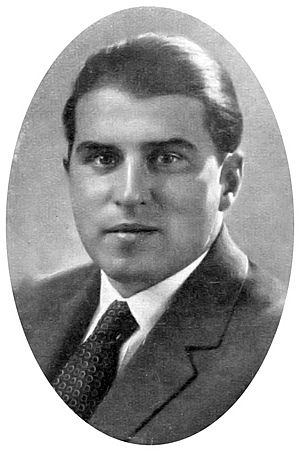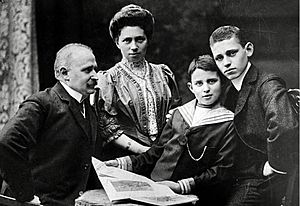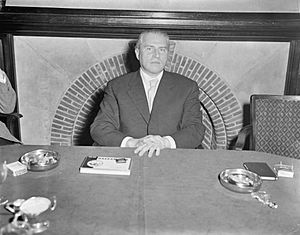Carl Zuckmayer facts for kids
Quick facts for kids
Carl Zuckmayer
|
|
|---|---|

Zuckmayer in 1920
|
|
| Born | 27 December 1896 Nackenheim, Rhenish Hesse, Germany |
| Died | 18 January 1977 (aged 80) Visp, Valais, Switzerland |
| Resting place | Saas-Fee, Valais, Switzerland |
| Occupation |
|
| Language | German |
| Citizenship |
|
| Notable awards |
|
Carl Zuckmayer (born December 27, 1896 – died January 18, 1977) was a famous German writer and playwright. He wrote many plays and stories. His older brother, Eduard Zuckmayer, was also a talented musician and teacher.
Life and Career
Carl Zuckmayer was born in Nackenheim, Germany. When he was four years old, his family moved to Mainz. When World War I started, he joined the German Army. He fought on the Western Front. During the war, he started publishing his first poems. After the war, he studied at the Goethe University Frankfurt. He studied subjects like humanities, biology, and botany.
Carl Zuckmayer's first attempts at writing for the theater were not very successful. His first play, Kreuzweg (1921), closed after only three performances. He also lost a job at a theater in Kiel after a controversial play he directed.
In 1924, he became a dramaturge (someone who helps choose and prepare plays) at the Deutsches Theater in Berlin. He worked there with another famous writer, Bertolt Brecht. After another play failed, he finally had a big success in 1925. This was with his comedy Der fröhliche Weinberg ("The Merry Vineyard"). It was written in his local dialect. This play won him the important Kleist Prize and started his successful career.
In 1925, Zuckmayer married an Austrian actress named Alice Herdan-Zuckmayer. They bought a house in Austria. His next play, Der Schinderhannes, was also a success.
In 1929, he wrote the script for the famous movie The Blue Angel, which starred Marlene Dietrich. That same year, he won another major German literary award, the Georg Büchner Prize.
In 1931, his play Der Hauptmann von Köpenick became very popular. However, when the Nazis came to power in Germany in 1933, his plays were banned. This was because Carl Zuckmayer's family had Jewish roots.
Carl and his family moved to their house in Austria. He continued to publish some works there. But after Austria was taken over by the Nazis, he lost his German citizenship. The Zuckmayers had to leave Europe. They fled through Switzerland to the United States in 1939. In America, he first worked as a scriptwriter in Hollywood. Then, in 1941, he rented a farm in Barnard, Vermont, and worked as a farmer until 1946.
During World War II (1943–1944), Zuckmayer wrote reports for the US government. These reports described German artists and writers and their connection to the Nazi government. This information became public much later, in 2002. His wife, Alice, wrote a popular book about their time on the farm in Vermont.
In January 1946, after World War II ended, Zuckmayer became a US citizen. He returned to Germany for five months as a cultural representative for the US. He wrote a report about what he saw in Germany. His play Des Teufels General ("The Devil's General"), which he wrote in Vermont, premiered in Zürich in 1946. This play was a huge success in post-war Germany. It was one of the first plays to deal with the difficult topic of Nazism after the war. It was even made into a movie in 1955.
Carl Zuckmayer kept writing many plays. He also wrote the screenplay for a German movie called Die Jungfrau auf dem Dach. After living in both the U.S. and Europe for several years, the Zuckmayers moved to Saas Fee in Switzerland in 1958. In 1966, he became a Swiss citizen. He also published his memoirs, called Als wär's ein Stück von mir ("A part of myself"). His last play, Der Rattenfänger, premiered in 1975. Carl Zuckmayer passed away on January 18, 1977, in Visp, Switzerland. He was buried in Saas Fee.
Carl Zuckmayer received many honors and awards throughout his life. Some of these include the Goethe Prize in 1952, the Bundesverdienstkreuz (a German award) in 1955, and the Austrian Staatspreis für Literatur (State Prize for Literature) in 1960.
Famous Works
Carl Zuckmayer wrote many plays and stories. Here are some of his most well-known plays:
- Der fröhliche Weinberg (1925) - This play helped launch his career.
- Schinderhannes (1927)
- The Captain of Köpenick (1931) - A very popular play about a man who pretends to be a military captain.
- Des Teufels General (1946) - A play about a German general during World War II.
Awards and Honors
Carl Zuckmayer received many important awards for his writing. Some of them include:
- 1925: Kleist Prize
- 1929: Georg Büchner Prize
- 1952: Goethe Prize
- 1955: Knight Commander's Cross of the Order of Merit of the Federal Republic of Germany
- 1960: Grand Austrian State Prize for Literature
- 1967: Pour le Mérite for Sciences and Arts
- 1972: Heinrich Heine Prize
|
See also
 In Spanish: Carl Zuckmayer para niños
In Spanish: Carl Zuckmayer para niños
 | Georgia Louise Harris Brown |
 | Julian Abele |
 | Norma Merrick Sklarek |
 | William Sidney Pittman |



